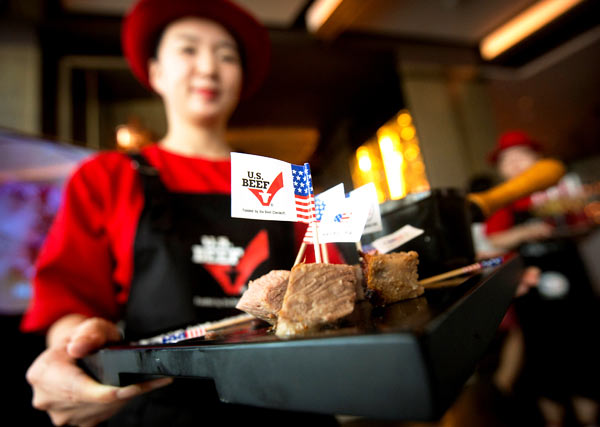
New York Times writes that bilateral talks aimed at reducing the U.S. trade deficit with China have yielded some initial deals, but U.S. firms say much more needs to be done as a deadline for a 100-day action plan expires on Sunday. The negotiations, which began in April, have reopened China's market to U.S. beef after 14 years and prompted Chinese pledges to buy U.S. liquefied natural gas. American firms have also been given access to some parts of China's financial services sector. More details on the 100-day plan are expected to be announced in the coming week as senior U.S. and Chinese officials gather in Washington for annual bilateral economic talks, rebranded this year as the "U.S.-China Comprehensive Economic Dialogue."...There has been little sign of progress in soothing the biggest trade irritants, such as U.S. demands that China cut excess capacity in steel and aluminum production, lack of access for U.S. firms to China's services market, and U.S. national security curbs on high-tech exports to China...Other sectors in China under U.S. pressure to open up have moved more slowly. Beijing had only approved two of the eight biotech crops waiting for import approval, despite gathering experts to review the crops on two occasions in a six-week period...Financial services is another area where little progress has been made, U.S. officials say.
Financial Times reports that Xi Jinping instructed China's state-owned enterprises to lower their debt levels but stopped short of announcing the creation of a new financial super-regulator to rein in mounting risks in the sector, as some had expected. "Deleveraging at SOEs is of the utmost importance," the Chinese president said at this weekend's National Financial Work Conference, which convenes only once every five years. He added that the country's financial officials must also "get a grip" on so-called "zombie" enterprises kept alive by infusions of cheap credit. Vigilance against mounting financial risks has become the top policy priority for Mr Xi, who wants to ensure economic and social stability in the run-up to a Communist party congress that will mark the beginning of his second five-year term. In April he convened a special meeting of the party's 25-member politburo on the subject, saying that "we cannot neglect any risk factors or hidden dangers". Mr Xi's warning about state-sector debt follows increased regulatory scrutiny of leverage last month at four of China's largest private-sector companies, which have led a surge in Chinese overseas M&A activity over recent years.
Reuters reports that China's economy grew 6.9 percent in the second quarter from a year earlier, faster than expected and in line with the first quarter's growth. Analysts polled by Reuters had expected the economy to expand 6.8 percent in the April-June quarter, slightly slower than the previous quarter's robust 6.9 percent pace. The government is aiming for growth of around 6.5 percent in 2017, slightly lower than last year's actual 6.7 percent, which was the weakest pace in 26 years. Many analysts expect the world's second-largest economy to lose steam later in the year as policy measures to rein in red-hot housing prices and a rapid build-up in debt take a greater toll on growth. Gross domestic product (GDP) in April-June grew 1.7 percent quarter-on-quarter, compared with growth of 1.3 percent in January-March, the National Bureau of Statistics said on Monday. Analysts had expected quarterly growth would quicken to 1.7 percent.
- 2017-07-14 China Changes How It Calculates GDP for First Time Since 2002
- 2017-07-13 China June exports, imports higher than expected as global demand holds strong
- 2017-07-12 China sends troops to Djibouti, establishes first overseas military base
- 2017-07-11 China says 'China responsibility theory' on North Korea has to stop
- 2017-07-10 Three PLAN Officers May Have Just Revealed What China Wants in the South China Sea
- 2017-07-09 China prepares fresh round of state-orchestrated megamergers
- 2017-07-07 If Trump wants China to solve the North Korea problem, he has to cater to Beijing's interests
- 2017-07-06 China could export a recession to everyone else, says ex-IMF chief economist Kenneth Rogoff
- 2017-07-05 After North Korea missile, Trump tweets: 'So much for China working with us'
- 2017-07-04 US confirms ICBM was tested by North Korea as Russia and China play peacekeepers
- New York Times China Central Bank Told by Xi to Play Bigger Role in Managing Financial Risk
- Bloomberg Five Takeaways From China's Weekend Meeting on Financial Regulation
- New York Times As China Prepares for New Top Leaders, Women Are Still Shut Out
- New York Times Arson Suspected in Fire in China That Killed at Least 22
- Bloomberg China Ex-Chongqing Party Chief Under Investigation
- Financial Times Winnie the Pooh blacklisted by China's online censors
- Financial Times Liu Xiaobo's ashes scattered at sea in hasty funeral
- Financial Times China uses investment funds to lead reform push
- Reuters Housing fire in eastern China kills 22, injures three: Xinhua
- Financial Times Chinese purchases of overseas ports top $20bn in past year
- Reuters China Q2 GDP growth likely to cool as Beijing targets property, debt risks
- Forbes How India Beats China At Trade
- Forbes President Trump's Steel Confusion
- Wall Street Journal 'Herculean' Pact to Open China's Markets Yields Less-Than-Heroic Results
